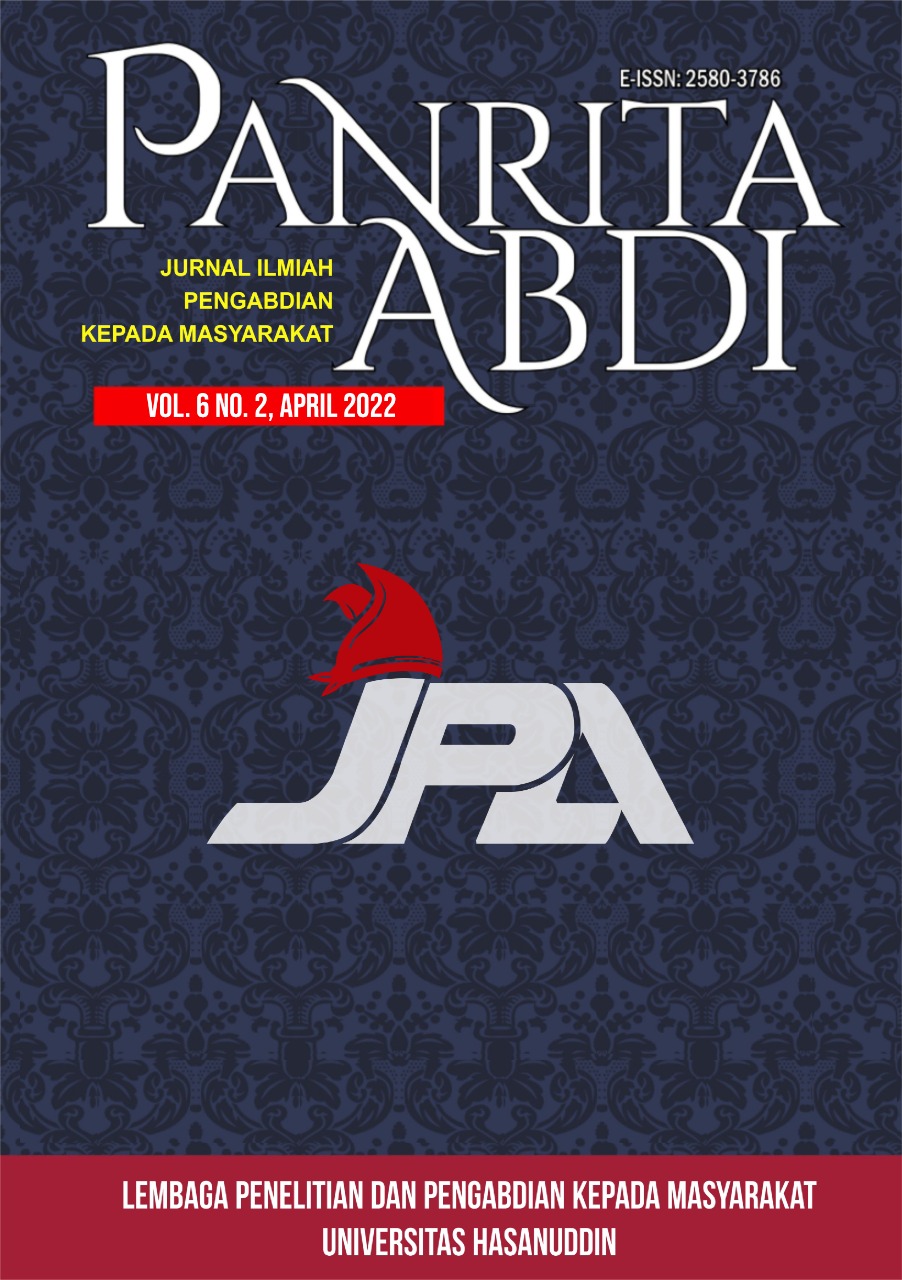IMPLEMENTASI MODEL PEMBELAJARAN KOOPERATIF KRITIS UNTUK MENINGKATKAN KUALITAS PRODUK PEMIKIRAN TULIS PADA MATAKULIAH PUISI
DOI:
https://doi.org/10.20956/pa.v6i2.14407Keywords:
Cooperative learning models, critical thinking skills, popular articles,, scientific articlesAbstract
This program aims to describe the implementation of the critical-cooperative learning model to improve the quality of written thinking products in the Poetry course. This program had an implementation of lesson study in four cycles. The data described the implementation process of the critical cooperative learning model to improve the quality of written thinking products and the results of students' written thinking products. The targets of this program were Indonesian Language Education students at Universitas Muhammadiyah Malang in the Poetry Course. Data collection is held by documentation and observation. Data analysis was carried out in several stages, namely (1) analyzing the learning process, (2) analyzing student activities, and (3) analyzing the results of the implementation of the critical cooperative learning model. This program found that the critical cooperative model successfully improved the quality of written thinking products in the form of popular articles and scientific articles. This result could be identified by the writing process carried out by students and the results of writing that students have revised. Cooperative learning was carried out through peer review and discussion activities. Students also improved their writing and critical thinking skills when compiling ideas in their articles. In the writing process of scientific papers, students also needed to be critical in relating the discussion to the theory and results of previous research. In the writing process of popular articles, students develop logical and critical arguments based on actual and factual phenomena in society. Critical thinking was not only limited to writing papers but also the peer review process. --- Program ini bertujuan mendeskripsikan implementasi model pembelajaran kooperatif kritis untuk meningkatkan kualitas produk pemikiran tulis pada matakuliah Puisi. Program ini merupakan implementasi lesson study dalam empat siklus. Data berupa deskripsi proses implementasi model pembelajaran kooperatif kritis untuk meningkatkan kualitas produk pemikiran tulis dan hasil produk pemikiran tulis karya mahasiswa. Sasaran kegiatan ini adalah mahasiswa Pendidikan Bahasa Indonesia Universitas Malang pada Matakuliah Puisi. Pengumpulan data dilakukan dengan dokumentasi dan observasi. Analisis data dilaksanakan dalam beberapa tahap, yaitu (1) menganalisis proses pembelajaran, (2) menganalisis aktivitas peserta didik, (3) menganalisis hasil implementasi model pembelajaran kooperatif kritis. Hasil kegiatan menunjukkan bahwa model kooperatif kritis berhasil dalam meningkatkan kualitas produk pemikiran tulis berupa artikel popular dan artikel ilmiah. Hal itu tampak dari proses penulisan yang dilakukan oleh mahasiswa dan hasil tulisan yang telah melalui revisi. Pembelajaran kooperatif dilaksanakan dalam bentuk kegiatan peer review dan diskusi. Mahasiswa juga menunjukkan peningkatan keterampilan dalam penulisan dan kemampuan berpikir kritis ketika menyusun gagasan-gagasan dalam artikel yang ditulisnya. Pada penulisan artikel ilmiah, mahasiswa juga perlu kritis dalam mengaitkan pembahasan dengan teori dan hasil penelitian sebelumnya. Pada penulisan artikel popular, mahasiswa mengembangkan argumen logis dan kritis berdasarkan fenomena actual dan faktual yang terjadi di masyarakat. Berpikir kritis tidak hanya terbatas pada penulisan artikel, melainkan juga proses mereview karya mahasiswa lain.
References
Altbach, P. G., Reisberg, L., & Rumbley, L. E. (2009). Trends in Global Higher Education: Tracking An Academic Revolution. In Paris: UNESCO.
Andrews, R. (2015). Critical Thinking and/or Argumentation in Higher Education. Dalam M. Davies, & R. Barnett (Eds.). The Palgrave Handbook of Critical Thinking in Higher Education. In London: Palgrave Macmillan (pp. 49–62).
Cavanagh, M. (2011). Students’ Experiences of Active Engagement through Cooperative Learning Activities in Lectures. Active Learning in Higher Education, 12(1), 23–33.
Çavdar, G., & Doe, S. (2012). Learning through Writing: Teaching Critical Thinking Skills in Writing Assignments. PS: Political Science & Politics, 45(2), 298–306. https://doi.org/doi:10.1017/s1049096511002137
Daud, N. S. M., Gilmore, A., & Mayo, H. E. (2013). Exploring The Potency of Peer Evaluation to Develop Critical Thinking for Tertiary Academic Writing. World Applied Sciences Journal, 21, 109–116. https://www.idosi.org/wasj/wasj21(SLTL)13/14.pdf
El Soufi, N., & See, B. H. (2019). Does Explicit Teaching of Critical Thinking Improve Critical Thinking Skills of English Language Learners in Higher Education? A Critical Review of Causal Evidence. Studies in Educational Evaluation, 60, 140–162. https://doi.org/https://doi.org/10.1016/j.stueduc.2018.12.006
Febrilia, B. R. A., Juliangkary, E., Yuliyanti, S., Prasetya, D. S. B., Pujilestari, & Setyawati, D. U. (2020). Workshop Penulisan Artikel Ilmiah Bagi Guru MIPA SMK Islam Al-Abhariyah Scientific Article Writing Workshop for MIPA Teachers at Al-Abhariyah Islamic Vocational School. Jurnal Panrita Abdi, 4(1), 69–76. http://journal.unhas.ac.id/index.php/panritaabdi
Genlott, A. A., & Gronlund, A. (2013). Improving Literacy Skills through Learning Reading by Writing: The iWTR Method Presented and Tested. Computers and Education, 67, 98—104. https://doi.org/http://dx.doi.org/10.1016/ j.compedu.2013.03.007
Gillies, R. M. (2014). Developments in Cooperative Learning: Review of Research. Anales de Psicología, 30(3), 792—801. https://doi.org/http://dx.doi.org/10.6018/analesps. 30.3.201191
Gunersel, A. B., Simpson, N. J., Aufderheide, K. J., & Wang, L. (2008). Effectiveness of Calibrated Peer Review for Improving Writing and Critical Thinking Skills in Biology Undergraduate Students. Journal of the Scholarship of Teaching and Learning, 8(2), 25–37.
Loes, C. N., & Pascarella, E. T. (2017). Collaborative Learning and Critical Thinking: Testing the Link. The Journal of Higher Education, 88(5), 726–753. https://doi.org/http://dx.doi.org/10.1080/00221546.2017.1291257
Matchett, N. J. (2009). Cooperative Learning, Critical Thinking, and Character: Techniques to Cultivate Ethical Deliberation. Public Integrity, 12(1), 25–38.
Shim, W.-J., & Walczak, K. (2012). The Impact of Faculty Teaching Practices on The Development of Students’ Critical Thinking Skills. International Journal of Teaching and Learning in Higher Education, 24(1), 16–30. http://www.isetl.org/ijtlhe/
Shimazoe, J., & Aldrich, H. (2010). Group Work Can Be Gratifying: Understanding & Overcoming Resistance to Cooperative Learning. College Teaching, 58(2), 52–57.
Tan, C. (2017). Teaching Critical Thinking: Cultural Challenges and Strategies in Singapore. British Educational Research Journal, 43(5), 988–1002. https://doi.org/DOI: 10.1002/berj.3295
Tsay, M., & Brady, M. (2010). A Case Study of Cooperative Learning and Communication Pedagogy: Does Working in Teams Make A Difference. Journal of the Scholarship of Teaching and Learning, 10(2), 78–89.
Downloads
Published
How to Cite
Issue
Section
License
Copyright (c) 2022 Arti Prihatini, Candra Rahma Wijaya Putra, Hari Sunaryo

This work is licensed under a Creative Commons Attribution-NonCommercial-NoDerivatives 4.0 International License.











